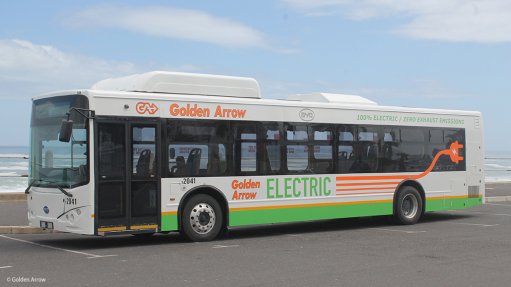
The 37-seater BYD GABS bus
Golden Arrow Bus Services (GABS) aims to add 60 locally built electric buses to its fleet in 2024, says GABS company engineer Gideon Neethling.
The Cape Town-based bus operator started testing two electric buses in April, 2021, utilising the 37-seater BYD K9 bus, from China.
In January of this year, the company expanded the testing process to include a Golden Arrow-specification 65-seater BYD electric bus.
The results of these tests have been “very positive”, says Neethling.
“Compared to the current diesel price, we expect the electricity costs to be approximately 70% less than the equivalent diesel costs per kilometre.
“The initial capital outlay may be two or three times the costs of a traditional internal combustion engine (ICE) bus, but this initial capital outlay will be recovered over the life of the vehicle.
“Electric vehicle technology is advancing rapidly – the latest bus has a 200-km range.”
Golden Arrow’s passengers have responded positively to the introduction of the electric vehicles and have voiced their support for the initiative, says Neethling.
Charging the three electric buses currently being tested has not posed any challenges, despite load-shedding intensifying this year, he adds.
“However, as scale is increased, the complexity of the process will also increase significantly.
“But, our scheduling profile provides two significant charging opportunities per day, and we believe that we will be able to address any potential challenges associated with a growing electric fleet.”
GABS is also diversifying its energy feed, and envisages that renewable (especially solar) energy sources will eventually provide a high percentage of the electricity needed to power the buses.
“At present we have installed 1.7 megawatt peak, with plans to continually increase capacity going forward,” says Neethling.
In terms of maintenance, electric vehicles require less maintenance than their ICE counterparts, as they have much fewer moving parts.
“We have trained a core group of artisans who focus on the electric vehicles and have not encountered any issues,” says Neethling.
Driving the vehicles has also not been a problem for GABS’ employees.
“There are no significant adjustments when switching to an electric vehicle,” notes Neethling.
“The regenerative braking functionality improves passenger experience and results in a better unit life for the braking systems.”
Some negatives on the balance sheet are the import duties and ad valorem taxes levied on the 65-seater bus, which add significantly to the cost of the vehicle.
“However, this can be avoided in future by building buses locally,” believes Neethling. “The next step then is to partner with local bus builders to build these buses in South Africa.”